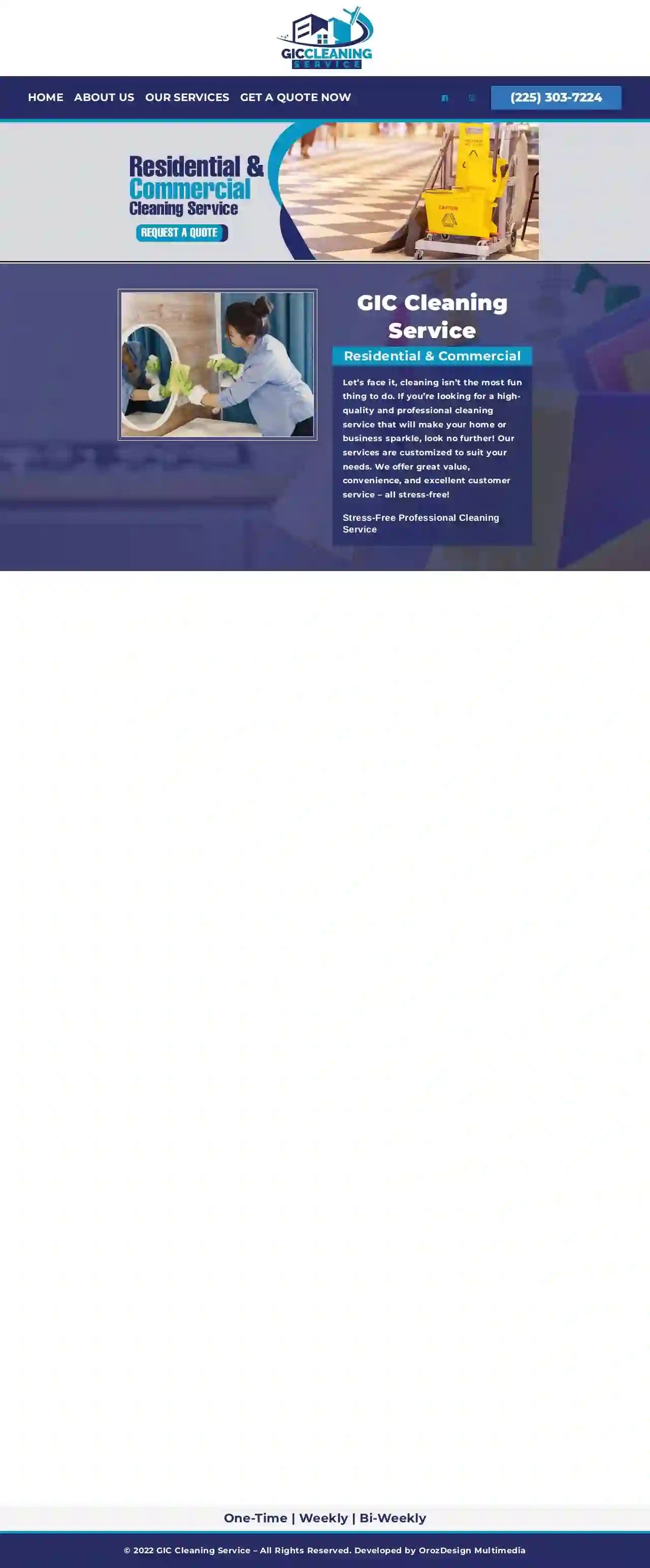Cleaning Services Graham
Find top Cleaning Services in Graham
Receive multiple Cleaning quotes for your project today! Compare profiles, reviews, accreditations, portfolio, etc... and choose the best offer.

GIC Cleaning Services
53 reviews123 Main St, Baton Rouge, 70809, USAt GIC Cleaning Service, we understand that cleaning isn't the most enjoyable task. That's why we offer high-quality, professional cleaning services tailored to your needs. Our goal is to provide the highest quality cleaning services in the area, ensuring your property looks its best. We're committed to delivering friendly, professional services that make your life easier. Whether you need one-time, weekly, or bi-weekly cleaning, we've got you covered. Our services include post-construction, commercial, spring, residential, move-in/move-out, basic, deep, and vacation rental cleaning. Request your quote now and let us take care of the dirt work for you!
- Services
- Why Us?
- Gallery
Get Quote
Veritas Environmental Services
4.99 reviewsHigh Point, US- Services
- Why Us?
- Gallery
Get Quote- Ca
Carmens Cleaning Service
523 reviewsHickory, US- Services
- Why Us?
Get Quote 
White Lotus Cleaning
4.720 reviewsRaleigh, US- Services
- Why Us?
Get Quote
Redefine Facility Cleaning
4.842 reviewsAsheville, US- Services
- Why Us?
Get Quote
North American Cleaning Systems
54 reviewsCharlotte, US- Services
- Why Us?
Get Quote
Safe Air Duct Cleaning Jacksonville
4.715 reviewsJacksonville, US- Services
- Why Us?
Get Quote
Coastal Cleaners of South Carolina
56 reviewsGastonia, US- Services
- Why Us?
Get Quote
Two Maids
4.5250 reviewsGreenville, US- Services
- Why Us?
Get Quote
Heather’s Home & Office Cleaning Service
514 reviewsHigh Point, US- Services
- Why Us?
Get Quote
Over 60,241+ Janitorial Companies registered
Our cleaning services operate in Graham & surrounding areas!
CleaningMatch has curated and vetted Top Cleaning Services arround Graham. Find a trustworthy contractor today.
Frequently Asked Questions About Cleaning Services
- Floors: Use floor cleaners designed for your specific floor type, such as hardwood, tile, or laminate. Avoid using harsh cleaners that can strip finishes or cause discoloration.
- Countertops: Clean granite, marble, or quartz countertops with pH-neutral cleaners to prevent etching or damage. Use disinfecting wipes or sprays for other countertops.
- Bathrooms: Use bathroom cleaners designed to remove soap scum, mildew, and hard water stains. Avoid using abrasive cleaners on fixtures or tiles.
- Glass and Mirrors: Clean windows and mirrors with glass cleaners that leave a streak-free finish. Avoid using paper towels, which can leave lint behind.
- Appliances: Clean stainless steel appliances with specialized cleaners that prevent streaks and fingerprints. Use degreasers for ovens and stovetops.
- Cleaning: Removing dirt, dust, and debris from surfaces using soap or detergent and water. It improves the appearance and removes visible contaminants.
- Sanitizing: Reducing the number of bacteria on surfaces to a safe level. It uses chemical disinfectants or heat to kill or inactivate bacteria.
- Disinfecting: Killing or inactivating most disease-causing microorganisms on surfaces. It uses stronger chemical disinfectants than sanitizing and targets a wider range of pathogens.
- Dishes: Load the dishwasher or wash dishes by hand.
- Sink: Clean the sink with a sponge or cloth and dish soap. Pay attention to the faucet and drain. You can also use a baking soda paste to remove stubborn stains.
- Countertops: Wipe down countertops with a disinfectant cleaner or all-purpose cleaner.
- Stovetop: Clean the stovetop with a degreaser or stovetop cleaner. Remove burner grates and wash them separately if needed.
- Oven: Clean the oven according to the manufacturer's instructions. You can use a self-cleaning function or a commercial oven cleaner.
- Microwave: Clean the microwave interior with a damp cloth or sponge. For stuck-on food, heat a bowl of water with lemon juice in the microwave for a few minutes to loosen debris.
- Refrigerator: Wipe down the refrigerator shelves and drawers with a damp cloth or sponge. Remove any expired food and clean spills promptly.
- Floors: Sweep or vacuum the floor, then mop with a floor cleaner suitable for your kitchen floor type.
- Trash: Empty the trash can and recycling bin.
How do I choose the right cleaning products for different surfaces?
If you're unsure about the right cleaning product for a surface, consult the manufacturer's instructions or seek advice from a cleaning professional.
Do I need to provide cleaning supplies for the cleaning service?
If you have specific preferences for cleaning products, such as eco-friendly or hypoallergenic options, communicate those to the cleaning service. They may accommodate your requests or allow you to provide your preferred supplies.
What is the difference between cleaning, sanitizing, and disinfecting?
Cleaning is usually the first step, followed by sanitizing or disinfecting depending on the level of hygiene required.
What is the most efficient way to clean a kitchen?
Regularly cleaning your kitchen helps maintain a hygienic and organized space for cooking and dining.
How do I choose the right cleaning products for different surfaces?
- Floors: Use floor cleaners designed for your specific floor type, such as hardwood, tile, or laminate. Avoid using harsh cleaners that can strip finishes or cause discoloration.
- Countertops: Clean granite, marble, or quartz countertops with pH-neutral cleaners to prevent etching or damage. Use disinfecting wipes or sprays for other countertops.
- Bathrooms: Use bathroom cleaners designed to remove soap scum, mildew, and hard water stains. Avoid using abrasive cleaners on fixtures or tiles.
- Glass and Mirrors: Clean windows and mirrors with glass cleaners that leave a streak-free finish. Avoid using paper towels, which can leave lint behind.
- Appliances: Clean stainless steel appliances with specialized cleaners that prevent streaks and fingerprints. Use degreasers for ovens and stovetops.
If you're unsure about the right cleaning product for a surface, consult the manufacturer's instructions or seek advice from a cleaning professional.
Do I need to provide cleaning supplies for the cleaning service?
If you have specific preferences for cleaning products, such as eco-friendly or hypoallergenic options, communicate those to the cleaning service. They may accommodate your requests or allow you to provide your preferred supplies.
What is the difference between cleaning, sanitizing, and disinfecting?
- Cleaning: Removing dirt, dust, and debris from surfaces using soap or detergent and water. It improves the appearance and removes visible contaminants.
- Sanitizing: Reducing the number of bacteria on surfaces to a safe level. It uses chemical disinfectants or heat to kill or inactivate bacteria.
- Disinfecting: Killing or inactivating most disease-causing microorganisms on surfaces. It uses stronger chemical disinfectants than sanitizing and targets a wider range of pathogens.
Cleaning is usually the first step, followed by sanitizing or disinfecting depending on the level of hygiene required.
What is the most efficient way to clean a kitchen?
- Dishes: Load the dishwasher or wash dishes by hand.
- Sink: Clean the sink with a sponge or cloth and dish soap. Pay attention to the faucet and drain. You can also use a baking soda paste to remove stubborn stains.
- Countertops: Wipe down countertops with a disinfectant cleaner or all-purpose cleaner.
- Stovetop: Clean the stovetop with a degreaser or stovetop cleaner. Remove burner grates and wash them separately if needed.
- Oven: Clean the oven according to the manufacturer's instructions. You can use a self-cleaning function or a commercial oven cleaner.
- Microwave: Clean the microwave interior with a damp cloth or sponge. For stuck-on food, heat a bowl of water with lemon juice in the microwave for a few minutes to loosen debris.
- Refrigerator: Wipe down the refrigerator shelves and drawers with a damp cloth or sponge. Remove any expired food and clean spills promptly.
- Floors: Sweep or vacuum the floor, then mop with a floor cleaner suitable for your kitchen floor type.
- Trash: Empty the trash can and recycling bin.
Regularly cleaning your kitchen helps maintain a hygienic and organized space for cooking and dining.